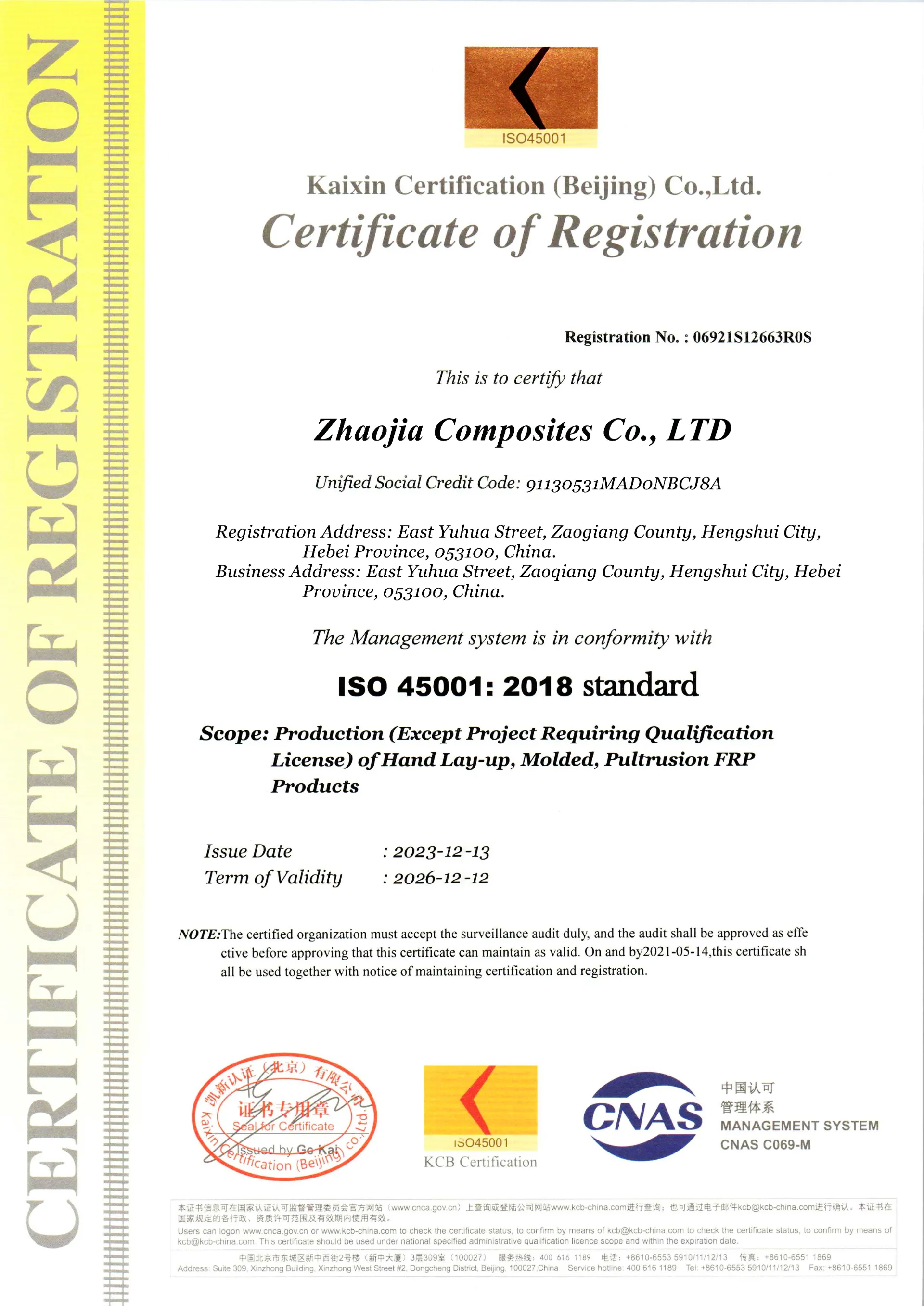loading...
- No. 9, Xingyuan South Street, Dongwaihuan Road, Zaoqiang County, Hengshui, Hebei, China
- admin@zjcomposites.com
- +86 15097380338
- Welcome to visit our website!
frp filter vessel
Understanding FRP Filter Vessels A Comprehensive Overview
Fiber Reinforced Plastic (FRP) filter vessels have become increasingly popular in various industrial applications due to their unique properties, including resistance to corrosion, lightweight nature, and durability. As the demand for effective filtration systems grows, it is essential to understand the structure, advantages, applications, and maintenance of FRP filter vessels.
What is FRP?
FRP is a composite material made from a polymer matrix reinforced with fibers, typically glass or carbon. The incorporation of these fibers provides enhanced strength and rigidity compared to standard plastics. The most notable trait of FRP is its resilience against harsh environmental conditions, making it suitable for challenging industrial processes.
Structure of FRP Filter Vessels
FRP filter vessels are designed to house various filtration media, including sand, activated carbon, and other granular materials, used to remove impurities from liquids or gases. The construction of these vessels involves layering fiberglass matting and resin, which is then cured to form a solid, robust structure. This manufacturing process allows for the creation of custom shapes and sizes, catering to specific filtration needs.
The typical design of an FRP filter vessel includes an inlet and outlet nozzle for fluid entry and exit, a perforated bottom plate to support the filtration media, and a manway for maintenance access. Advanced models may also feature pressure gauges, sample ports, and even automated backwashing systems that enhance their efficiency.
Advantages of FRP Filter Vessels
1. Corrosion Resistance One of the most significant advantages of FRP filter vessels is their exceptional resistance to chemicals and corrosive environments. Unlike metal vessels that can rust or corrode over time, FRP can withstand harsh chemicals, making it ideal for wastewater treatment, chemical processing, and other challenging applications.
2. Lightweight FRP filter vessels are considerably lighter than their metal counterparts. This property reduces transportation and installation costs, as cranes or heavy machinery may not be required. Their lightweight nature also allows for easier handling during routine maintenance.
frp filter vessel

3. Durability The durability of FRP filter vessels means they can withstand high pressures and temperatures, ensuring a longer service life. This resilience leads to lower operational costs as the need for frequent replacements is minimized.
4. Customizability FRP can be molded into various shapes and sizes, enabling manufacturers to provide tailored solutions to meet specific filtration needs. This customizability is crucial for industries that require unique configurations or specialized filtration processes.
5. Thermal Insulation FRP materials have excellent thermal insulation properties, which can help maintain the temperature of fluids being filtered. This feature can be particularly beneficial in processes where temperature control is critical.
Applications of FRP Filter Vessels
FRP filter vessels find applications in a diverse range of industries. Some notable sectors include
- Water Treatment Used in municipal and industrial water treatment facilities to remove contaminants and purify drinking water. - Chemical Processing Employed in various chemical manufacturing processes to filter out impurities and by-products. - Food and Beverage Provide effective filtration solutions in food processing applications, ensuring product safety and quality. - Oil and Gas Used in the extraction and processing of oil and gas, where fluid impurities must be controlled to enhance product quality.
Maintenance of FRP Filter Vessels
Routine maintenance is vital to ensure optimal performance and longevity of FRP filter vessels. This includes regular inspections for any signs of wear or damage, cleaning of filters or media, and ensuring that all connections and fittings remain secure. It is also advisable to refer to the manufacturer's guidelines for specific maintenance schedules and recommended practices to sustain the health of the vessel.
Conclusion
In conclusion, FRP filter vessels represent a significant advancement in filtration technology. Their unique properties, coupled with their adaptability to various industries, make them an excellent choice for anyone looking to enhance their filtration processes. As industries continue to evolve, the demand for reliable, effective, and durable filtration systems like FRP filter vessels is expected to rise, underscoring the importance of understanding this innovative solution.
-
GRP Structures: The Future of Lightweight, High-Performance EngineeringNewsJun.20,2025
-
FRP Water Tank: High-Performance Storage for Corrosive and Clean Water SystemsNewsJun.20,2025
-
FRP Square Tube: The New Industry Standard for Chemical and Structural ApplicationsNewsJun.20,2025
-
FRP Pultruded Profiles: The Ultimate Choice for Lightweight Structural StrengthNewsJun.20,2025
-
FRP Handrails: The Safer, Smarter, and Stronger Choice for Modern InfrastructureNewsJun.20,2025
-
FRP Grating: The Smart Solution for Durable, Lightweight Industrial FlooringNewsJun.20,2025
-
Why Choose a Galvanized Water Tank for Your Storage NeedsNewsMay.21,2025
